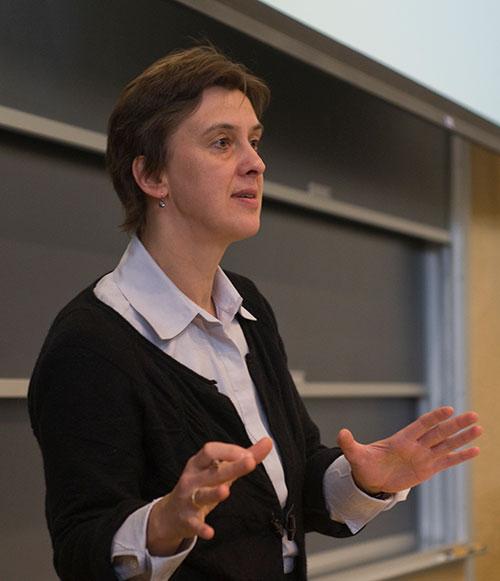Market Watch
Columbia Law School Professor Katharina Pistor Has Launched a Global Research Network to Explore What the Relationship Between Law and Finance Can Teach Us About Preventing Economic Disasters.
New York, October 10, 2013—When a period of hyperinflation threatened the German economy in the 1920s, the German Supreme Court took matters into its own hands.
It no longer enforced legal contracts as written when doing so would bankrupt a debtor. Instead, the Reichsgericht used the principle of good faith to interpret binding agreements based on the reality of the circumstances, inserting a system of safety valves into the German civil code and allowing the courts to ward off financial disaster.
This novel response was explored by German-born Columbia Law School Professor Katharina Pistor in “A Legal Theory of Finance,” an influential paper she published in the Journal of Comparative Economics. In the paper, Pistor describes the law-finance paradox that led to the Reichsgericht’s actions: financial markets are legally constructed, but if all financial commitments were enforced irrespective of fundamental change, the markets would collapse. The law-finance paradox also explains the U.S. government’s decision to bail out major financial institutions like AIG after the start of the 2008 financial crisis. The conclusion was that doing nothing may have precipitated broader harm to the world’s economy.
| Professor Katharina Pistor |
Pistor’s theory grew out of a two-year research project called the Global Finance and Law Initiative, which was sponsored by the Institute for New Economic Thinking. The paper has already spurred debate about the workings of the world's markets and prompted Pistor to teach a yearlong class called Law and Finance Theories.
Now, Pistor, a leading authority on the interplay among law, sovereign states, and the global financial system, is launching the Global Law in Finance Network (GLawFiN), bringing together a team of researchers and students to explore and critique her Legal Theory of Finance based on detailed analysis of the legal structure of financial markets. In January, the network will make its debut with an invitation-only workshop at Columbia University’s Global Center in Paris. As part of the event, Pistor will convene economists and philosophers from around the world to discuss and debate the theory’s merits. In addition to Pistor, the network consists of Oxford University Lecturer Dan Awrey, Goethe University Professor and Columbia Law School International Visiting Professor of Law Brigitte Haar, and three doctoral students.
Pistor, who is supporting the network using prize money from her 2012 Max Planck Research Award as well as matching funds from the Institute for New Economic Thinking, has marshaled an impressive team of academics and practitioners to serve on the GLawFiN advisory board. The members are: John Armour, a UniCredit Visiting Professor of European Legal Studies at Columbia Law School who holds the Hogan Lovells Professorship in Law and Finance at Oxford law; Jeffrey Golden, a visiting professor at the London School of Economics and Political Science; Jeffrey N. Gordon, the Richard Paul Richman Professor of Law at Columbia Law School; Martin Hellwig, director of the Max Planck Institute for Research on Collective Goods; Cathy M. Kaplan, a partner and co-head of the New York Global Finance Practice at Sidley Austin; and Daniela Weber-Rey, chief governance officer and deputy global head compliance at Deutsche Banke.
Under the law-finance paradox, bailouts like those initiated in 2008 to rescue major banks are likely inevitable. But Pistor hopes the Global Law in Finance Network can help shape reforms—such as the safety valves used by the Reichsgericht in 1920s Germany—to prevent future widespread economic disasters.
Pistor’s work on the Legal Theory of Finance and GLawFiN falls under the rubric of the Center on Global Legal Transformation, which she established in 2010 as a multi-disciplinary venue to re-conceptualize existing theories of law and governance. In addition to her duties at Columbia Law School, Pistor is an honorary president of the World Interdisciplinary Network for Institutional Research, which brings together researchers who study how organizations and institutions affect economic and social life.
